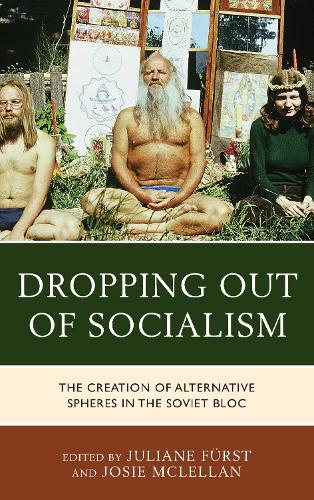
Dropping out of Socialism: The Creation of Alternative Spheres in the Soviet Bloc
(Hardback)
Available Formats
Publishing Details
Dropping out of Socialism: The Creation of Alternative Spheres in the Soviet Bloc
By (Author) Juliane Frst
Edited by Josie McLellan
Contributions by Maria-Alina Asavei
Contributions by Irina Costache
Contributions by Madigan Andrea Fichter
Contributions by Juliane Frst
Contributions by Irina Gordeeva
Contributions by Joachim Hberlen
Contributions by Jeff Hayton
Contributions by Anna Kan
Bloomsbury Publishing PLC
Lexington Books
13th December 2016
United States
Classifications
Professional and Scholarly
Non Fiction
Social and cultural history
Far-left political ideologies and movements
Essays
947
Winner of Choice Outstanding Academic Title 2017
Physical Properties
Hardback
352
Width 160mm, Height 236mm, Spine 18mm
431g
Description
The essays in this collection make up the first study of dropping out of late state socialism in Eastern Europe and the Soviet Union. From Leningrad intellectuals and Berlin squatters to Bosnian Muslim madrassa students and Romanian yogis, groups and individuals across the Eastern Bloc rejected mainstream socialist culture. In the process, multiple drop-out cultures were created, with their own spaces, music, values, style, slang, ideology and networks. Under socialism, this phenomenon was little-known outside the socialist sphere. Only very recently has it been possible to reconstruct it through archival work, oral histories and memoirs. Such a diverse set of subcultures demands a multi-disciplinary approach: the essays in this volume are written by historians, anthropologists and scholars of literature, cultural and gender studies. The history of these movements not only shows us a side of state socialist life that was barely known in the west. It also sheds new light on the demise and eventual collapse of late socialism, and raises important questions about the similarities and differences between Eastern and Western subcultures.
Reviews
Many of these essays could be successfully employed as introductory material for undergraduate and graduate courses in history, anthropology, and literature, and they can also help provide a useful background to introduce more recent political processes in the area. . . . Dropping Out of Socialism constitutes an important step toward the creation of international and interdisciplinary collaborations for the study of an importan [sic] subject, which clearly needs to be explored further in all of its complex ramifications. * The Russian Review *
Coeditors Frst and McLellan have edited a new collection of essays that illuminate the diverse ways that citizens of the Soviet Union and East European countries did not conform to the expectations of communist society during the second half of the 20th century. The 12 essays are engaging and show a side of late socialist society that has not been fully explored by scholars before. Part I includes essays on yoga in Romania, hippies in Estonia, and student activists in Yugoslavia. Part II addresses smuggled literature (samizdat) and peace movements in the Soviet Union. One of the most intriguing essays addresses the use of Commodore 64 computers during the 1980s in Poland and how that had an impact on late Cold War politics. The five chapters in the last two sections explore an eclectic range of rebellious movements, including living in communes, punk rock music, and squatting in housing developments. This is an imaginative collection of essays that sheds new light on how at least some people lived in the last decades of communism in the Soviet Union and Eastern Europe. Summing Up: Highly recommended. All academic levels/libraries. * CHOICE *
The relativization of the east-west divide, without obliterating the differences between alternative practices on two sides of the Iron Curtain, is a welcome feature of this book, in part reflecting the inspiration and influence of Alexei Yurchaks seminal work on late socialist (late Soviet) subjectivity and culture. . . there remains much to learn from and appreciate about the theoretical, historiographic, and ethnographic contributions of this book to the study of the former Soviet Bloc. * Slavic Review *
Focusing on various forms of self-consciously alternative cultures that formed in Eastern Europe under communist rule, this innovative collection of essays explores practices which cannot be framed in the familiar terms of dissidence and loyalty. Eschewing politicsat least in the terms which had been drawn up by the regimehippies in Estonia, East German punks, followers of Eastern gurus and aesthetics in Romania and Yugoslavia, enthusiasts for home computing in Poland and others found their own ways of 'dropping out. But, as the authors of the vivid and well-researched studies in this anthology demonstrate, alterity required the norms which had been defined by the state and its resources. Sensitive to the subtle meanings of language and gesture, lifestyle, and dress; skilled interpreters of the codes of official media and secret police reports; and alert to the distortions of post-socialist memory, these scholars reconstruct the lives and attitudes of fascinating and often forgotten communities. -- David Crowley, Royal College of Art
Author Bio
Juliane Frst is senior lecturer in twentieth-century history at the University of Bristol. Josie McLellan is reader in modern European history at the University of Bristol.
